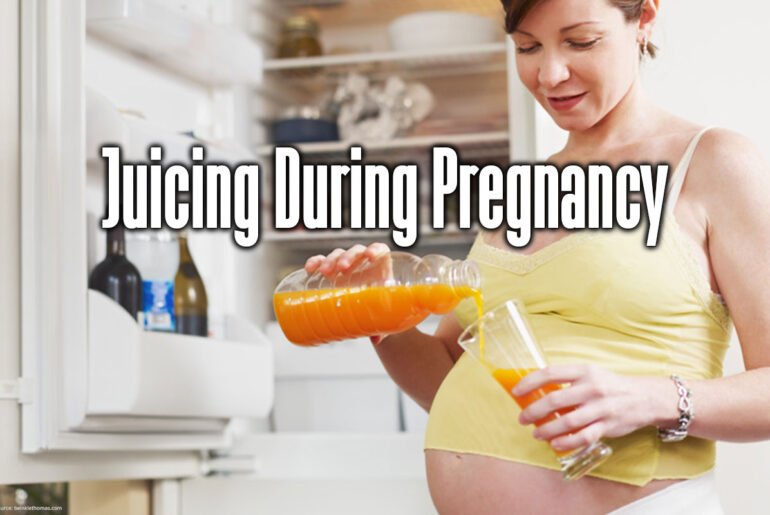Juicing during Pregnancy allows you to get the nutrients you may miss if you don’t eat enough vegetables and fruits daily.
You still have to eat a wide variety of nutritious foods. Your body requires nutrients and healthful meals to sustain your growing fetus. It’s essential to keep your weight in check.
I frequently recommend consulting with your doctor in many juicing articles before starting Juicing during Pregnancy. When you’re pregnant, the final thing you want to do is eat foods that don’t provide you with all of the nutrients you need.
It’s a lot to handle during pregnancy, both physically and emotionally. There are also a few foods on the “do not eat” list. Let’s go through everything below.
Table of Contents
Pregnancy
Prepare your body before you conceive by eating nutritious meals and getting active daily. The healthier you are before you get pregnant, the better your prenatal health will be during and after delivery.
The first trimester might be difficult because many women experience morning sickness, severe tiredness, and a significant appetite.
During the second trimester, you’ll be feeling great because your energy will return, morning sickness will subside, and you’ll begin to feel the baby move.
Things will get tight as your due date approaches when you reach the third trimester. It may make you sleepless and feel more stressed in the final month.
Avoid or Not to Avoid?
Many foods are discouraged for expectant moms by doctors. Why? Your immune system is modified during pregnancy in a variety of ways.
You are more prone to sickness, especially food-borne diseases. These germs can harm you, but many of them can harm your baby.
It’s always preferable to be safe for your unborn kid. Below I’ve compiled a list of things to avoid since they have been linked to health problems in pregnant women, which can harm the fetus.
Alcohol
According to the CDC, there is no such thing as a safe amount of alcohol during pregnancy. Alcohol can enter the bloodstream through blood-brain barriers, although it may also pass through the placenta.
If you’re drinking, your baby is drinking too. If you drink alcohol when you’re pregnant, your baby can develop many Fetal Alcohol Spectrum Disorders (FASD) problems.
The injuries to your baby’s development are irreversible. It’s preferable to take precautions and avoid alcohol until after the baby is born.
Wait until your child is weaned before drinking since your milk will absorb the alcohol if you intend to breastfeed.
If you need assistance with an alcohol problem, contact your local community or call any of the following organizations for help:
- The National Clearinghouse for Drug Information and Alcohol, Inc. – 800-729-6686
- National Alcohol & Drug HopeLine (800) NCA-CALL (800-622-2255)
- Substance Abuse Treatment Facility Locator – 800-662 HELP (800-662-4357) findtreatment.samhsa.gov
- Check your local listings for a support group in Alcoholics Anonymous (AA) – aa.org.
You may learn more by going to the National Institute on Alcohol Abuse and Alcoholism.
Undercooked or Raw Meats and Fish
This includes eggs, oysters, sushi, sashimi, and even steak. If you eat undercooked meat or fish during pregnancy, you’re more likely to get E. coli, trichinella, Toxoplasma gondii, or salmonellosis.
You can still consume these foods, but they’re thoroughly cooked. Yes, you can eat medium-well steak, but never rare.
Avoid eating fish with a lot of methylmercury. King mackerel, shark, trout, tuna, swordfish, and tilefish are among them.
Also, if you’re buying deli meat, be wary since it may be tainted with Listeria if not handled carefully.
To destroy germs, cook the meat to an internal temperature of 160°F (or until it is steaming) for at least nine months. It’s not much longer than that.
Avoid Soft, Unpasteurized Cheeses
The American Pregnancy Association advises that you avoid cheeses like Camembert, Brie, feta, goat, and blue-veined types unless the packaging indicates they were created with pasteurized milk.
Also, avoid eating Mexican cheeses like queso fresco, queso Blanco, and Panela that do not say they are pasteurized on the label. Instead, eat hard or semi-soft cheeses like cheddar, Gouda, Swiss, and mozzarella.
Caffeine
Caffeine is harmful to the fetus during pregnancy. During the first trimester, you should limit your intake of caffeine. It’s not recommended that you drink one cup of coffee every day during pregnancy; however, it’s good to quit the habit if you’re a heavy coffee user.
We’re talking about more than two cups or 200 milligrams each day. If you have a caffeine addiction while pregnant, your baby will.
Headache, irritability, lethargy, and sadness are caffeine withdrawal symptoms.
Processed Foods
These meals are high in sugar, salt, and fat, but they also include additives and preservatives that extend their shelf life, making them unhealthier for you and your child.
Anything Greasy or Fried
Greasy meals can exacerbate morning sickness if you already have them.
Furthermore, the calories and lack of nutrients will not benefit you or your kid. Eat saltine crackers or create your homemade candied ginger to avoid nausea.
Juicing during Pregnancy
Because the juice is unpasteurized, pregnant women are advised not to consume it at juice bars, restaurants specializing in freshly squeezed juice, and other locations. Furthermore, the techniques to clean aren’t always followed correctly.
If the fruit isn’t thoroughly washed, germs like salmonella or E. coli may infect you. Store-bought juices are “healthy” but do not include your body’s nutrients and enzymes.
However, if you take appropriate precautions, fruit and vegetable juicing at home may be done safely.
Types of Juicing During Pregnancy
Replacing meals with freshly extracted juice is the basic idea of a juice fast. You should never do a juice quickly during pregnancy because you will not get all of the nutrients your body and fetus require if everything you eat is juice.
When you combine fresh juice with your regular diet, you’re fasting. This is an excellent form of juicing for adding extra antioxidants, vitamins, and enzymes to your diet.
Tips for Juicing during Pregnancy
- To minimize your exposure to pesticides, eat organically grown produce as often as feasible. When browsing a store, prioritize by consulting the “Clean 15” and “Dirty Dozen” lists.
- Even if you buy organic, wash your food thoroughly in a washer.
- Juicing during Pregnancy daily is recommended. You can always benefit from an extra nutritional boost during the day while you’re pregnant.
- If you’re juicing with a masticating juicer, store your freshly pressed juice in a glass container with an airtight lid. Please place it in the fridge for no more than 72 hours. When utilizing a fast (centrifugal) juicer, drink your juice as soon as possible. It will keep for 24 hours when properly preserved, but it will not indefinitely.
- Before eating, drink your juice on an empty stomach.
What to Juice
When it comes to Juicing during Pregnancy, use a wide range of colors in your vegetable juice, but keep the fruit to a minimum to make it more pleasant, especially if you’re new.
Carrots and cucumbers can help to hide stronger-tasting greens as well. Gardens are best when combined with an acidic/sour taste, such as a lemon or green apple.
Add the following items to your list of fresh produce for Juicing during Pregnancy:
- Fresh ginger root will provide a little spice while aiding in nausea management. Ginger has antioxidants that help cure a common cold and sore throats, improve blood flow and reduce cholesterol. It’s a great vitamin C and iron source, too.
- Carrots are high in beta-carotene and vitamin E. When consumed whole, they make an excellent snack. Add a few of these to your juicing recipes to break down the rigid cellular walls and benefit from its antioxidant properties.
- Cucumbers are anti-inflammatory, anti-edematous, and diuretic in nature.
- Peppers are high in vitamin C, vitamin E, and various carotenoids. Compared to orange and yellow peppers, red peppers have the most significant nutritional value. Green peppers are the unripe form of red peppers.
- Beetroot is high in antioxidant betacyanin and fiber, glutamine, beta-carotene, and vitamin C. It increases energy levels while lowering blood pressure and being inflammatory.
- Kale contains folate and other vital nutrients like vitamins K, A, and C. Kale plays an essential role in preventing congenital disabilities like spina bifida.
- Spinach has a lot of iron, folate, vitamins A, C, E, and several other nutrients necessary for a nutritious diet. It improves bone health, is low in calories, and has anti-inflammatory properties.
- Tomatoes are high in vitamins and antioxidants, which help boost energy levels, digestion, and the production of new red blood cells.
- Despite their sweetness and the fact that they should be consumed sparingly, Apples are high in vitamin C.
- Oranges are high in folate, vitamin C, calcium, thiamin, and vitamin A. The sugar level is high, so use these only in moderation.
Don’t forget to include the following foods (juicing, smoothies, or eating whole) in your diet:
- Bananas
- Strawberries
- Raspberries
- Avocados
- Sweet Potato
- Oatmeal (rolled or steel-cut)
- Watermelon
- Cantaloupe
- Asparagus
- Broccoli
- Wheatgrass
- Celery
- Papaya
- Grapes
- Lentils
- Yogurt
- Edamame
- Nuts (like almonds)







3 Comments
Pingback: Is Juicing Safe for Diabetes? - Blender Advisors
Pingback: Juicing for Kids - Blender Advisors
Pingback: Is Your Juicer BPA Free? - Blender Advisors